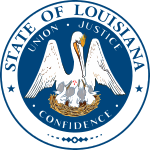「」
| |||||||||||||||||||||||||||||
| |||||||||||||||||||||||||||||
 Parish Results
| |||||||||||||||||||||||||||||
| |||||||||||||||||||||||||||||
| Elections in Louisiana |
|---|
 |
|
|
The 1896 United States presidential election in Louisiana took place on November 3, 1896. All contemporary 45 states were part of the 1896 United States presidential election. State voters chose eight electors to the Electoral College, which selected the president and vice president.
Following the overthrow of Reconstruction Republican government, Louisiana, like most of the former Confederacy, established a Democratic-dominated but highly fraudulent political system[1] that would from 1890 be challenged by the rise of the Populist Party due to declining conditions for farmers. Both the Populists and the earlier Greenback Party — who shared key leaders like James B. Weaver — would be supported by the state Republican Party.[2] At the same time, outside of Acadiana — where French Catholic beliefs produced less hardline attitudes towards black voting[3] — intimidation was already either drastically reducing the number of black voters or counting them for Democrats hostile to their interests.[4]
By the 1890s the Louisiana Republican Party was deeply divided between “black and tans” and an insurgent “lily white” faction led by Acadian sugar planters,[5] and the state Democratic Party was divided less deeply between pro- and anti-lottery factions.[6] To avert the fragmented 1892 gubernatorial election, both Republican factions would organize a fusion with the Populist Party, who had run a separate candidate that year. This fusion ticket, headed by sugar planter John Pharr, would be denied according to later analysis by the persistent electoral fraud,[7] and in the immediate aftermath of a potential civil war due to a planned Populist march on Baton Rouge, the Democrats would pass laws to disenfranchise the remaining black voters and also many poor whites[8] — which they would complete during the ensuing gubernatorial term.[9]
Louisiana was won by the Democratic nominees, former U.S. Representative William Jennings Bryan of Nebraska and his running mate Arthur Sewall of Maine, though four electors would cast their vice presidential ballots for Thomas E. Watson. They defeated the Republican nominees, former Ohio Governor William McKinley and his running mate Garret Hobart of New Jersey. Bryan won the state by a landslide margin of 54.57%.
As this was the last election before disfranchising constitutional conventions ended black voting in Acadiana as well as the rest of the state, McKinley did retain overwhelming support in several sugarcane-growing parishes opposed to the anti-tariff Democratic policy.[3]
Bryan would later win Louisiana against McKinley again four years later and would later win it again in 1908 against William Howard Taft.
- ^ Hair, William Ivy (1969). Bourbonism and agrarian protest; Louisiana politics, 1877-1900. pp. 114–115. ISBN 0807109088.
- ^ Kousser, J. Morgan (1975). The Shaping of Southern Politics: Suffrage Restriction and the Establishment of the One-Party South, 1880-1910 (Second Printing ed.). New Haven, Connecticut: Yale University Press. p. 25. ISBN 0-300-01973-4.
- ^ a b Howard, Perry H. (1954). "A New Look at Reconstruction". Political Tendencies in Louisiana, 1812-1952; An Ecological Analysis of Voting Behavior (Thesis). LSU Historical Dissertations and Theses. pp. 112–113.
- ^ Dethloff, Henry C.; Jones, Robert R. (Autumn 1968). "Race Relations in Louisiana, 1877-98". Louisiana History: The Journal of the Louisiana Historical Association. 9 (4). Louisiana Historical Association: 301–323.
- ^ Heersink, Boris; Jenkins, Jeffrey A. Republican Party Politics and the American South, 1865-1968. pp. 265–266. ISBN 1107158435.
- ^ Hair. Bourbonism and Agrarian Protest, pp. 168-169
- ^ Kousser. The Shaping of Southern Politics, p. 41
- ^ Hair. Bourbonism and Agrarian Protest, pp. 261-268
- ^ Lewinson, Paul (1965). Race, class and party; a history of Negro suffrage and white politics in the South. New York City: Grosset & Dunlap. p. 81.
© MMXXIII Rich X Search. We shall prevail. All rights reserved. Rich X Search


